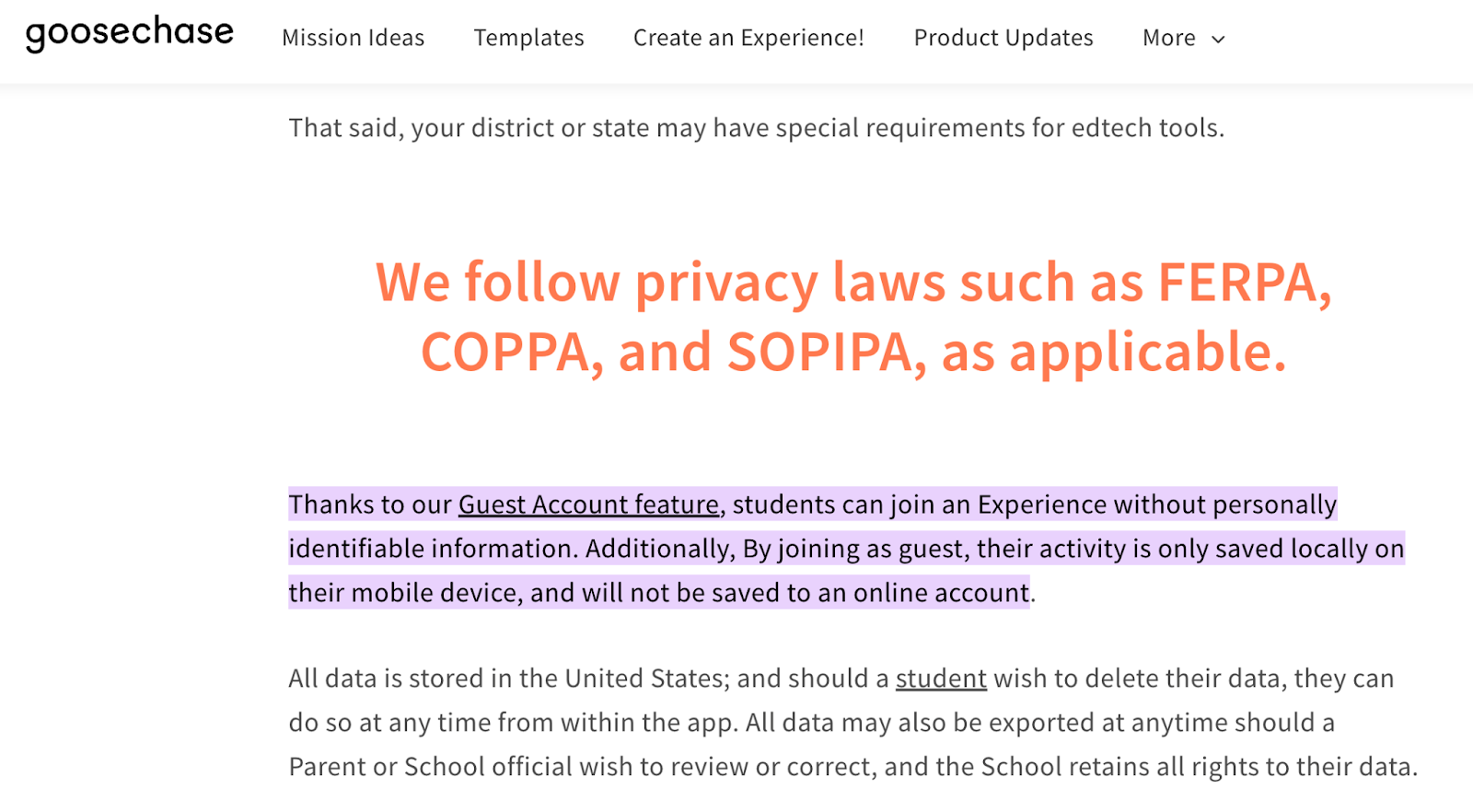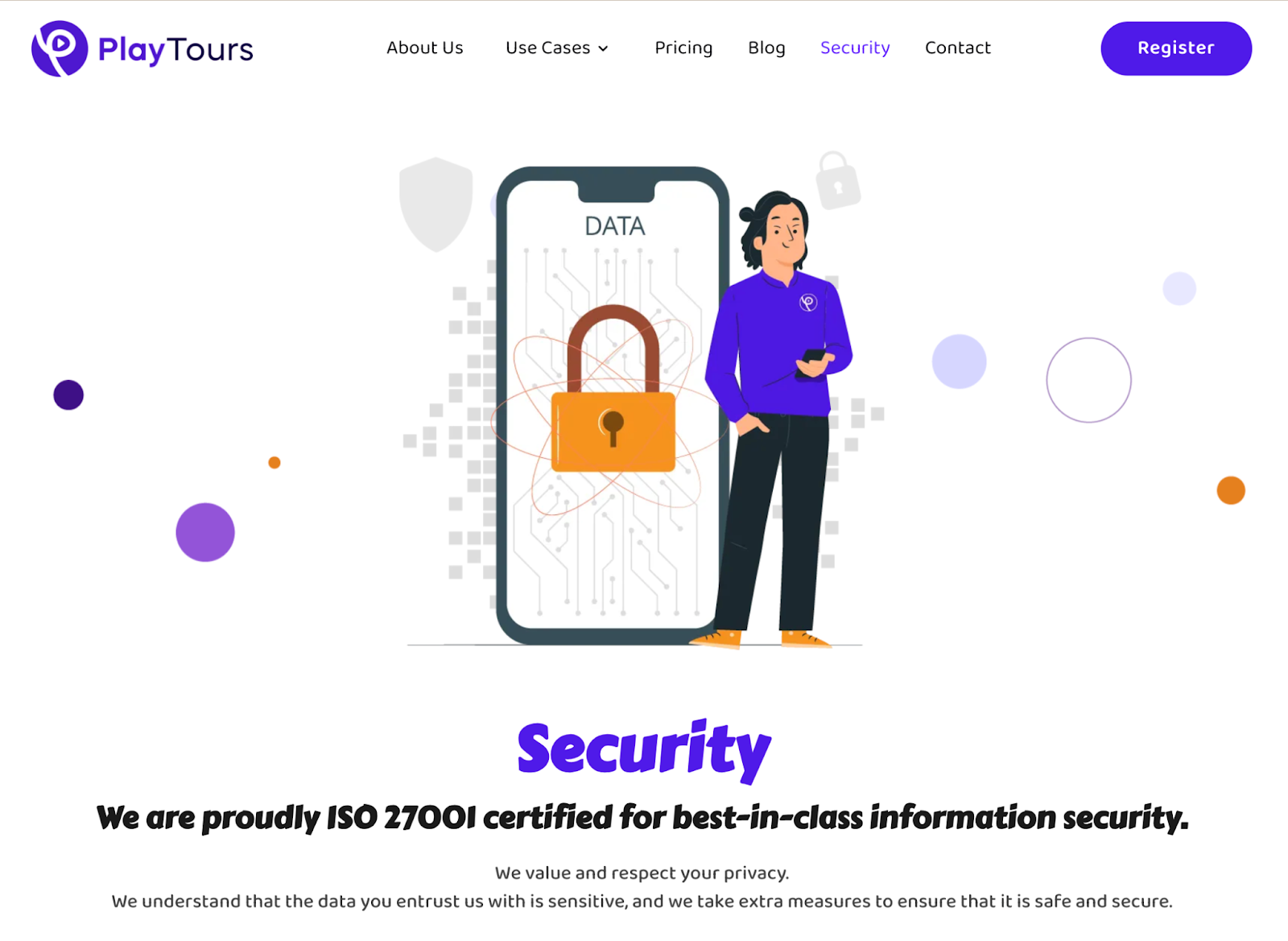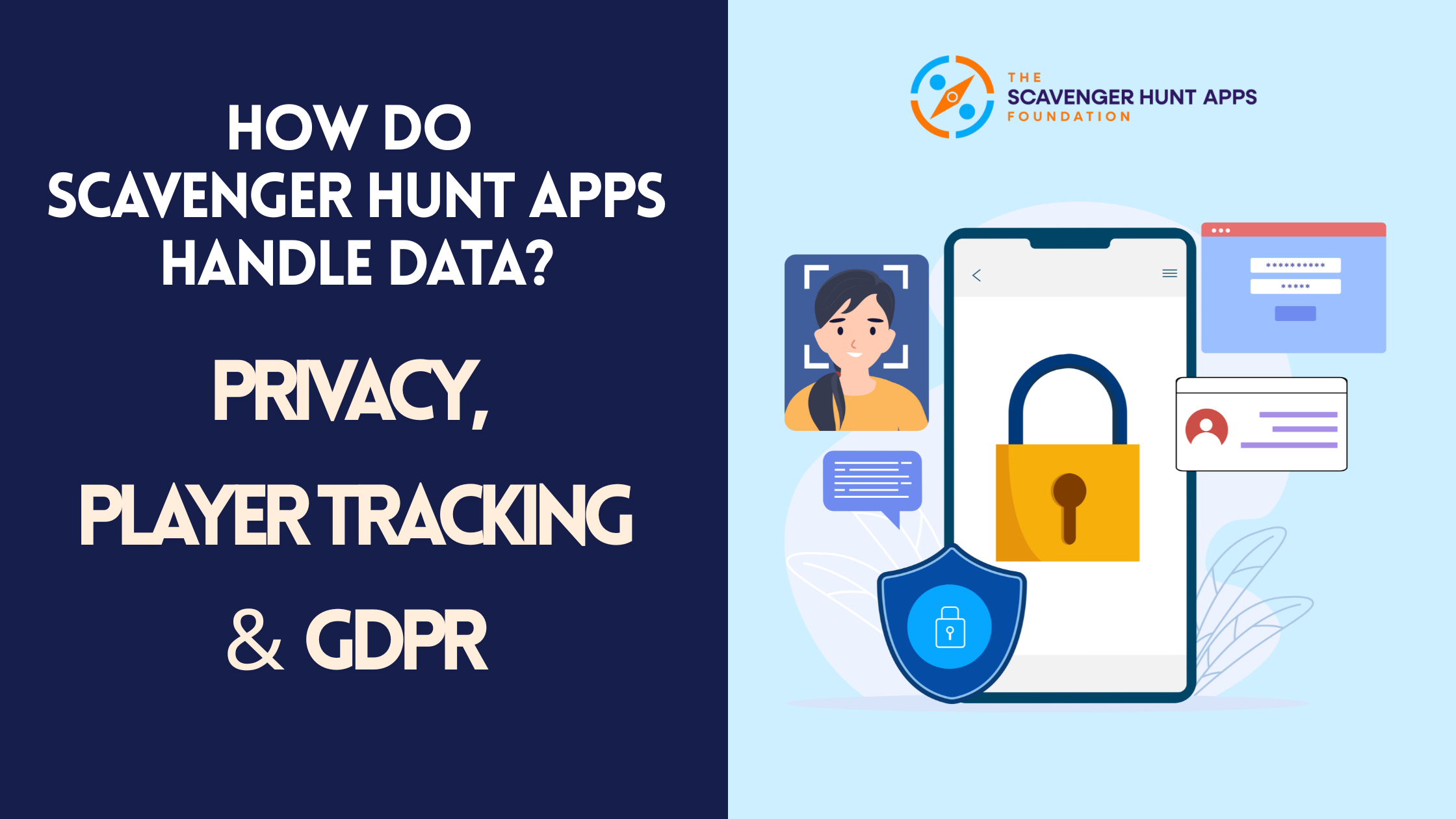Scavenger hunt apps are used for team building, education, tourism, and events; they collect and process various user data to deliver interactive experiences. Popular platforms like PlayTours, Goosechase, Scavify, and Actionbound all handle personal information (from GPS location to photos and emails) and must balance fun gameplay with privacy protections.
Data Collected by Scavenger Hunt Apps
Personal Information and Account Data: All scavenger hunt apps require some personal data to create accounts or enable features. Typically, users (organizers and players) provide identifiers like name or nickname and an email address when registering. Organizers can input additional details to set up their game (e.g. event name, custom questions, team names, and emails), but these are generally confined to what’s necessary to run the hunt.
User-Generated Content: A core feature of these apps is collecting content that players submit during hunts. This includes photos, videos, audio clips, text answers, and quiz responses. Such user-generated content (UGC) is voluntarily provided by participants as part of gameplay. For instance, players might upload a team selfie or check in at a GPS location. The apps store this content so it can be viewed by the organizer and participants (e.g., in a live feed or after-action report). Actionbound notes that photos taken during a hunt are stored so that the bound creator and players “have them in one place and can look at them again”. These platforms treat UGC carefully: Actionbound explicitly assures users that “your data or pictures” will never be sold or monetized, remain your property, and can be deleted by you at any time. In other words, the participant-created photos/videos are used only to facilitate the game experience and are not exploited beyond that context.
Location and Device Data: Because scavenger hunts often involve location-based challenges, apps can collect GPS coordinates or other location data. Typically, this happens only when needed for a specific task and with the user’s permission. Aside from GPS, these apps gather standard device and usage data for functionality and analytics: e.g., device type, OS version, IP address, browser details, and usage logs (which missions were completed, timestamps, etc.). Such data helps ensure compatibility, troubleshoot issues, and provide organizers with insight into gameplay (like how long players took on tasks).
PlayTours explicitly states that any customer data arising from players participating in games an organizer created is owned by the organizer and not shared with any other accounts. Thus, participant data is siloed per event/organizer; other PlayTours customers cannot access it. Participants, on the other hand, provide their data (either directly or via an organizer’s invitation) with the expectation it’s used for gameplay and not beyond. The apps generally meet this expectation by avoiding any extraneous collection (no unnecessary personal details) and by sandboxing each event’s data.
In fact, players can use Actionbound without registering an account at all; in that case, “no personal data will be retained” by the platform. This means a participant can join a hunt as a guest (perhaps just entering a nickname) and remain anonymous to the service; a feature especially useful in classroom settings or public events where privacy is a concern.
In Goosechase’s educational mode, likewise, teachers can enable a “guest” join option so students don’t have to submit any personal info; the student’s activity stays local on the device and isn’t saved to an online profile.
User Consent and Permissions
Account Registration and Privacy Notices: When users sign up or join a game, they must agree to the platform’s terms and privacy policy, which is the baseline consent for data processing. All the mentioned apps publish privacy policies explaining their data practices, and users implicitly consent by using the service. Many also present additional notices for specific audiences (e.g. Goosechase has a separate Student Privacy Policy addressing COPPA/FERPA requirements for minors in school games).

Organizers often have to obtain participants’ consent in contexts like corporate events or classroom use, usually by informing them that the app will collect certain data for the game. In educational settings, parental consent might be required for minors.
Just-in-Time Permissions (Camera, GPS, etc.): A key aspect of scavenger hunt apps is that they leverage device features (camera, microphone, GPS location) during gameplay. All these apps follow a practice of requesting runtime permissions when needed. Unlike some mobile apps that ask for blanket access up front, scavenger hunt platforms try to be context-specific.
For instance, PlayTours being web-based, “only requests permissions contextually, such as when a task requires camera access,” rather than demanding broad device permissions at install. This just-in-time approach means a participant will see a browser or app prompt at the moment they tap “Take Photo” or “Check GPS,” giving them a clear choice to allow or deny that specific access. This granular consent builds trust and keeps users in control of what they share. If a user denies a permission, the worst outcome is that they cannot complete that particular task but they can often continue with other challenges.
Consent for Use of Content and Data: Participants also have control over whether certain personal data gets publicized. For example, Actionbound does not automatically publish players’ results or photos to the public; it asks players at the end of a Bound (game) whether they consent to making their photos and scores public on the game’s page. If players decline, their photos stay private (visible only to the organizer or within the team). Similarly, organizers on any platform can configure privacy settings of events, e.g., making a hunt private/unlisted so that only people with the link or code can join, which is common practice for corporate or school events. These measures ensure that players knowingly consent to any broader sharing of their gameplay data.
Player Tracking and Location Use Practices
Location Tracking: Location features are common in scavenger hunts (e.g., “Go to X landmark and check in”). However, these apps do not perform continuous background tracking of users in the way a navigation app might. The GPS data is typically used in a focused manner: to verify if a player is within a required location radius when they attempt a location-based task, or to timestamp/geo-tag a submission if relevant. Once the task is done, any location information is either discarded or stored as a simple record (e.g. “Player A checked in at Central Park at 3:45pm”). There’s no indication that these apps keep a live log of a participant’s movements beyond the game interactions.
For privacy, apps ensure location access is voluntary. As described, users must grant GPS permission at runtime, and they can revoke it at any time via their device settings. If revoked, the app simply cannot use location features. There is no clandestine tracking: if the app is closed or the hunt is over, it stops requesting location. Moreover, some apps offer alternatives to GPS tasks (QR code scans or code words) if organizers or players prefer not to use location at all.
Player Progress Tracking: Apart from GPS, “tracking” in these apps mostly refers to monitoring game progress. Organizers have dashboards where they can see what missions each team has completed, the points scored, and the content submitted.
For example, PlayTours provides a live game leaderboard and real-time submission feed so that event organizers (and sometimes all players) can follow the action as it unfolds. This live tracking is an intended feature to enhance engagement and allow moderation if needed. Organizers can often download the results at the end, for instance, PlayTours allows exporting all data (e.g. a CSV of submissions) at any time, which is useful for judging or record-keeping.
GDPR Compliance and Data Protection Measures
- Transparency and Notices: The apps provide privacy policies detailing what data is collected and how it’s used. PlayTours highlights that it is certified ISO/IEC 27001 (an international standard for information security management) and is audited for GDPR compliance, a level of security “that banks and MNCs can trust”.

They also often publish additional disclosures or guides for specific sectors, e.g. Goosechase has enhanced COPPA/FERPA disclosures for U.S. schools and a Privacy FAQ for how they meet U.S. state school privacy requirements. Users are notified of policy changes; Goosechase, for example, announced an update in 2022 to give users more control and explicitly stated the changes in a blog post.
- Data Minimization and Purpose Limitation: As noted, these services strive to collect only what is necessary. Actionbound succinctly answers the question of retaining personal data: “We have only ever retained user data that is necessary for the usage of our products. We only save personal information that you provide to us… The app can also be used without registering. In this case, no personal data will be retained.”. Any personal info collected is used solely to provide and enhance the service, not for unrelated purposes. And as a rule, these apps do not sell personal data (each of their privacy statements include a clear assurance on this point).
- No Selling of Data & Limited Sharing: All representative apps make a strong point that they do not sell user data to third parties. Any sharing of data is restricted to service providers or subprocessors under strict contracts, or to the organizer of the game.
- Security Measures: Protecting data from unauthorized access is a priority. Encryption is widely used, e.g. Scavify encrypts passwords (one-way hashing so even they can’t read them) and transmits sensitive info like credit card data over SSL with no plaintext storage. All traffic and submissions are typically sent securely (HTTPS). Some providers have gone further by obtaining security certifications.
Actionbound, being based in Germany, hosts all data on servers located in Germany and notes that all of their hosting providers are ISO 27001:2013 certified as well. Keeping data on EU servers helps with GDPR’s data residency preferences and reduces cross-border transfer issues. Goosechase stores data in the United States, but as a Canadian company, they still adhere to GDPR for EU users and likely use standard contractual clauses or similar safeguards for any EU-US data transfers (their privacy policy references GDPR compliance and international transfer mechanisms).
- User Rights (Access, Deletion, Portability): GDPR grants users rights over their data, and these apps provide mechanisms to exercise them. Deletion rights are strongly supported. Goosechase’s 2022 update introduced the “ability to seamlessly delete your account from within the app [or website]” at any time. This allows a user (organizer or participant) to self-serve and erase their personal data and content. PlayTours similarly notes that as part of their service, user data can be deleted, and in fact, they automatically remove old user-submitted content after 90 days.
As for rectification and correction, users can edit their profiles or request corrections. And objection/restriction rights are addressed by the ability to opt out of marketing communications (all apps allow unsubscribing from newsletters or promotional emails, respecting preferences) and by not using data for automated decision-making beyond the game itself.
- Breach Notification and Accountability: GDPR mandates reporting data breaches. While none of these companies have reported major incidents publicly, they do have breach notification policies. PlayTours explicitly includes in its SLA that “in the event of any data breaches… PlayTours will notify affected users as soon as reasonably possible” with details and remediation steps. This shows accountability. Furthermore, each platform typically has a Data Protection Officer (DPO) or contact (often an email like privacy@company.com) through which users can raise concerns or requests, as required by GDPR.
Data Sharing with Third Parties
Unlike some free consumer apps, scavenger hunt platforms do not partner with advertisers or data brokers. PlayTours clearly states it does not display ads and “does not sell or provide data” from your use of the service to any advertising partners. Goosechase similarly proclaims it never sells user data and doesn’t serve third-party ads. This means your information isn’t being sent out to ad networks like Facebook or Google for targeting. Users won’t suddenly see unrelated marketing as a result of participating in a scavenger hunt, which is a big privacy safeguard.
All these companies rely on some third-party services to function, examples include cloud hosting (servers on AWS or similar), payment processors for billing, email/SMS services for notifications, or analytics tools to monitor system performance. When data is shared with these third parties, it’s done under strict agreements. Scavify discloses that it can employ third-party companies to process personal information on its behalf (for example, to send emails or process credit card payments), but always “based on our instructions and in compliance with this Privacy Statement,” and with confidentiality obligations. In EU terms, these providers are sub-processors, and platforms like Actionbound and PlayTours will include them in their GDPR data processing addendums. All user data remains under the app’s control even when a third-party service is used, e.g., a photo uploaded might be stored on Amazon S3 servers in Frankfurt (as Actionbound does) but Amazon cannot access or use that photo except to store and retrieve it for Actionbound.
All privacy policies include that the company may disclose data if required by law or to protect rights and safety. For example, if a law enforcement agency lawfully demands certain data, or if needed to investigate fraud or a security issue, the app provider can comply.
Conclusion
From a trust standpoint, participants can take some comfort in the common commitments by these apps: content they create is theirs and can be removed by them, their data is not resold, and any personal details beyond the game are generally not needed. If anything seems off, e.g., if a game organizer is asking for very personal information that seems unrelated to a scavenger hunt, the participant should question it or decline, as it might violate the platform’s terms (which, as noted, prohibit asking sensitive info).
In practice, most scavenger hunts ask for fun or trivial inputs (selfies, trivia answers, etc.), so privacy risks are low. Players should still exercise basic caution: use the privacy settings (some apps allow you to set your profile to private or control notifications), and be mindful that other players might see what you post in-game.
Both organizers and participants share a mutual interest: making the scavenger hunt enjoyable without compromising anyone’s privacy or security. By following the platform’s guidelines and using the available privacy controls, organizers can run hunts that comply with data protection laws and respect players’ data, and participants can engage confidently, knowing their information is handled responsibly.


